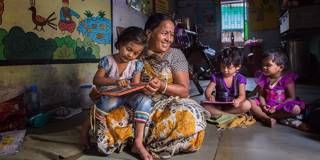Since the start of the pandemic, the world’s wealthiest countries have sought to strengthen their domestic childcare infrastructure and broaden access. But if these countries truly want to improve the economic outlook for women globally, they must invest in childcare programs abroad, too.
WASHINGTON, DC – When COVID-19 lockdowns began, the importance of affordable childcare suddenly became a lot clearer to many more people, especially working women. Last year, women spent three times as many hours as men providing additional unpaid childcare, losing an estimated $800 billion in income as a result. The gender gap in childcare provision is even wider in low- and middle-income countries. In India, for example, women provided ten times as much unpaid childcare as men.

WASHINGTON, DC – When COVID-19 lockdowns began, the importance of affordable childcare suddenly became a lot clearer to many more people, especially working women. Last year, women spent three times as many hours as men providing additional unpaid childcare, losing an estimated $800 billion in income as a result. The gender gap in childcare provision is even wider in low- and middle-income countries. In India, for example, women provided ten times as much unpaid childcare as men.